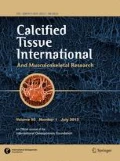SUMMARY
ELISAs for measuring the urinary excretion of collagen crosslinks and related peptides appear to show marked differences in sensitivity to anti-resorptive therapy. This presumably reflects variations in specificity of the anylate being detected in these assays, and the way in which they respond to treatment. To clarify these points, we used HPLC analysis to assess the effect of four weeks treatment with the amino-bisphosponate, neridronate, on free and peptide-bound fractions of the collagen cross-links deoxypyridinoline (Dpd) and pyridinoline (Pyd). Six postmenopausal women, in whom two hour morning urine samples were obtained at baseline (x2), and one, two and four weeks after commencing treatment, were included. We found that neridronate had relatively little effect on peptide-bound or free urinary Pyd, but markedly reduced peptide-bound urinary Dpd. However, urinary excretion of free Dpd was not significantly affected. As a consequence of these differential effects on collagen cross-link excretion, neridronate led to a striking increase in the free/total Dpd ratio, and in the peptide-bound Pyd/Dpd ratio. We conclude that neridronate, and presumably other bisphosphonates, selectively suppresses peptide-bound Dpd excretion, possibly reflecting altered processing of collagen crosslinks released during bone resorption.
Author information
Authors and Affiliations
Additional information
Received: 12 February 1996 / Accepted: 12 June 1996
Rights and permissions
About this article
Cite this article
Tobias, J., Laversuch, C., Wilson, N. et al. Neridronate Preferentially Suppresses the Urinary Excretion of Peptide-Bound Deoxypyridinoline in Postmenopausal Women. Calcif Tissue Int 59, 407–409 (1996). https://doi.org/10.1007/s002239900148
Published:
Issue Date:
DOI: https://doi.org/10.1007/s002239900148

